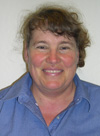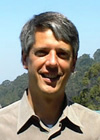|
|
A full listing of the Lab's activities is available on the |
|

|
|
Today
11 a.m.
Nuclear Science
Radioactive Decay of the Neutron
Jeffrey Nico, NIST
Bldg. 50 Auditorium
Noon
CITRIS
Safe Drinking Water for Developing Countries
Ashok Gadgil
290 HMMB
Noon
Dance Club
Intermediate Rumba Lesson
Bldg. 51 Lobby
12:15 p.m.
Yoga Club
Class with Chris Hoskins
Bldg. 70-191
1 p.m.
Scientific Computing
The Counter-Intuitive Properties of Ensembles for Machine Learning, or, Democracy Defeats Meritocracy
Philip Kelgemeyer, Sandia Lab
Bldg. 50B-2222
3 p.m.
CXRO
Large Scale Electronic Structure Calculations of Nanosystems
Lin-Wang Wang
Bldg. 6-2202
6 p.m.
Nuclear Engineering Graduate Student Assoc.
The Global Expansion of Nuclear Power: U.S. Roles and Perspectives
Paul Lisowski, Global Nuclear Energy Partnership
Goldman School, 2607 Hearst Ave., Room 150
Tomorrow
Noon
Environmental Energy Technologies
Solar Desiccant Cooling
Paul Bourdoukan, U. of La Rochelle, France
Bldg. 90-3122
1:30 p.m.
Materials Sciences
Resonant Soft X-Ray Spectroscopy and Scattering to Probe Beneath the Surface: Applications to Magnetic and Polymeric Systems
Jeff Kortright
Bldg. 66 Auditorium
3:30 to 6:30 p.m.
Craft Fair
Handmade Holiday Gifts for Sale
Cafeteria
4 p.m.
Physics
The SuperB Project
Francesco Forti, INFN, Italy
Bldg. 50A-5132
5:30 p.m.
CITRIS
The Future of Energy at Berkeley
Paul Alivisatos, Arun Majumdar, and Harvey Blanch
105 Stanley Hall
|
|
|
 |
|
| |
Breakfast: Chorizo Scramble with Flour Tortillas
Tomorrow's Breakfast: Popeye Omelet with Fruit Salad
Cultural Cuisine: Chicken Parmigiana with Pasta and Veggies
Pizza: Pineapple and Ham
Deli: Sicilian Combo Prestini
Grill: Philly Cheese Steak with Onion Rings
Carvery: Roasted Turkey Breast with Mashed Potatoes
| B'fast: |
6:30
a.m. - 9:30 a.m. |
| Lunch: |
11
a.m. - 1:30 p.m. |
| Full
menu |
| |
|
|
|
 |
|
 |
Windows Group Staffer
Organizes Craft Fair
|
|
|
|
 |
 |
|
|
| Mitchell |
|
|
|
Meet Robin Mitchell, who works for the Windows and Daylighting Group in the Environmental Energy Technologies Division. The group has developed software programs used by the windows industry to rate the efficiency of their products. “I coordinate the program and design efforts, and provide user support, documentation, and training,” explains Mitchell. When not at work, she can be found partaking in “serious” vegetable gardening, weaving, bike riding, and whitewater rafting. But during the holiday season, she is busy organizing the Lab’s annual craft fair, which takes place tomorrow from 3:30 to 6:30 p.m. in the cafeteria. “I started as a crafter in 1998, and started helping (former organizer and employee) Shelley Worsham in 1999,” she says. Mitchell took over the reins after Worsham’s departure several years back. “There is such a variety of creative talent at the Lab, which you wouldn't know about otherwise,” says Mitchell of her commitment to the fair. “We have amazing writers, musicians, photographers, potters, jewelry makers, and bakers…the list goes on and on.”
 |
 |
|
 |
|
 |

Dark Energy Research
Chronicled in Articles
Early in 1998, Berkeley Lab’s Supernova Cosmology Project and a rival team announced one of the most important cosmological discoveries ever: the expansion of the universe is accelerating, propelled by what would soon be called dark energy. Science historian Robert Crease interviewed Saul Perlmutter, Gerson Goldhaber, and members of both teams for a chronology in Physics World, examining key ambiguities of the scientific process, including the role played by rivalry, what exactly constitutes "discovery," and the difficulty of assigning credit for team science when Nobel Prizes are at stake. Full story. In a companion piece, here, Perlmutter and Eric Linder look at the decade ahead.
|
| |
 |
|
| Chu |
‘Class of 2020’ Segment
On Today Includes Chu
NBC aired the latest chapter of its "Class of 2020” series on the Today show on Monday. The series is following a group of students from their first day in kindergarten to their high school graduation. Every two weeks, the program focuses on a different facet of their education through the students', parents' and teachers' eyes. Science was this week’s theme, and Berkeley Lab Director Steve Chu was featured in the report. “The capital of the 21st century in the United States is our human capital, and that’s the key to our prosperity,” he says. Go here to view the video.

Falcone, ALS Brighten Science's Future
By Kathleen Wong
|
|
|
|
 |
 |
|
|
| Falcone |
|
|
|
Ultrafast processes, like the rapid exchange between photons, cones and rods that make vision possible, are everywhere, says Advanced Light Source Director Roger Falcone, including plants performing photosynthesis, hemoglobin shuttling oxygen to cells, and sunlight converting pollutants into smog. "Most chemical reactions have many fast and complicated steps in between, and those are what we're trying to unravel at the ALS," Falcone says. The ALS produces beams of x-ray light a billion times brighter than radiation from the sun, and with a team of scientists and engineers there, Falcone helped develop an instrument that converts x-rays into extremely rapid bursts. Full story.
|
 |
|
|
|
|

Faster Computers Speed The Pace of Discovery
Sometime next year, developers will boot up the next generation of supercomputers, machines whose vast increases in processing power will accelerate the transformation of the scientific method, experts say. The first "petascale" supercomputer will be capable of 1,000 trillion calculations per second. That's about twice as powerful as today's dominant model, BlueGene/L. The computing muscle of the new petascale machines will be akin to that of more than 100,000 desktop computers combined, experts say. A computation that would take a lifetime for a home PC and that can be completed in about five hours on today's supercomputers will be doable in as little as two hours. Full story.
|
|
|
 |
|
|
|
|
 EMERGENCY INFO EMERGENCY INFO |
 |
Emergency: Call x7911
Cell Phones: Call 911
Non-emergency Incident Reporting: Call x6999
SECON level 3
More Information |
 |
|
|
 |
|
|

